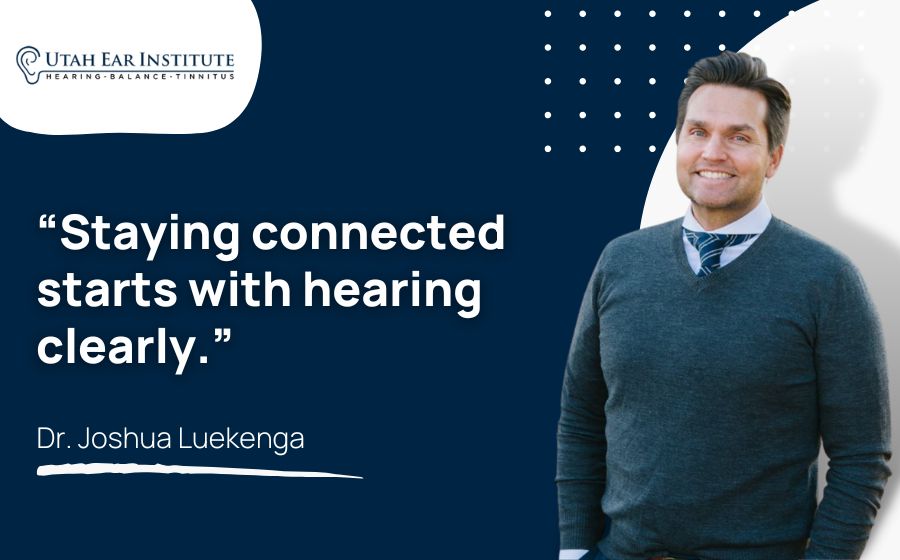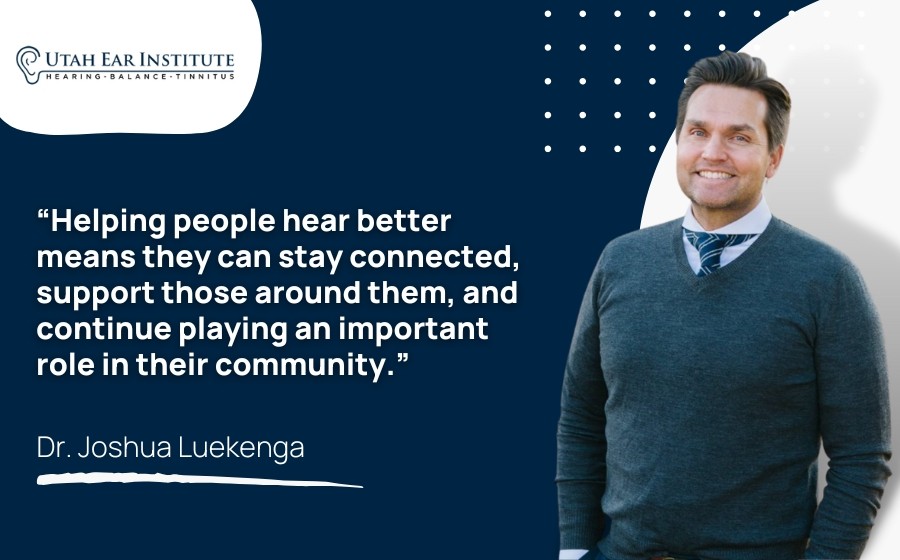Hyperacusis Specialists Northern Utah Locals Trust
Do sounds like children screaming, machinery or electrical devices, and sharp, high-pitched noises like car alarms or bus brakes cause you to cringe and look for an escape? Although none of us enjoy these sounds, those experiencing hyperacusis experience them at an increased level of intensity that causes an enormous amount of discomfort.



In general, hyperacusis affects between 1% and 20% of the population with a higher rate of prevalence in women than men. Although it is more common among individuals with specific conditions (WS, tinnitus, and autism), hyperacusis also exists in the normal hearing population, increasing with age.
If sounds that did not bother you in the past cause you a great deal of discomfort and make you want to isolate yourself from them, you may benefit from hyperacusis counseling and therapy.
Is there someone who provides hyperacusis treatment near me?
Fortunately, there is. Utah Ear Institute provides hyperacusis testing and counseling in our Bountiful, Tooele, Park City, and West Valley City hearing and balance clinics.

In general, hyperacusis affects between 1% and 20% of the population with a higher rate of prevalence in women than men. Although it is more common among individuals with specific conditions (WS, tinnitus, and autism), hyperacusis also exists in the normal hearing population, increasing with age.
If sounds that did not bother you in the past cause you a great deal of discomfort and make you want to isolate yourself from them, you may benefit from hyperacusis counseling and therapy.
Is there someone who provides hyperacusis treatment near me?
Fortunately, there is. Utah Ear Institute provides hyperacusis testing and counseling in our Bountiful, Tooele, Park City, and West Valley City hearing and balance clinics.

In general, hyperacusis affects between 1% and 20% of the population with a higher rate of prevalence in women than men. Although it is more common among individuals with specific conditions (WS, tinnitus, and autism), hyperacusis also exists in the normal hearing population, increasing with age.
If sounds that did not bother you in the past cause you a great deal of discomfort and make you want to isolate yourself from them, you may benefit from hyperacusis counseling and therapy.
Is there someone who provides hyperacusis treatment near me?
Fortunately, there is. Utah Ear Institute provides hyperacusis testing and counseling in our Bountiful, Tooele, Park City, and West Valley City hearing and balance clinics.
Hyperacusis and Its Causes
In individuals with hyperacusis, the brain confuses or exaggerates certain vibrations, so even though they experience the same signals as others, the brain reacts differently to them, intensifying them to a point of causing pain.
Cochlear hyperacusis, the most common form, causes a mild to severe pain as a result of intolerance to everyday noises, while vestibular hyperacusis causes vertigo, nausea, and a general sense of imbalance.
Hyperacusis usually stems from having certain diseases or health issues, such as:
An injury to your head
Damage to one or both ears by ototoxic medications or other toxins
Excessive exposure to loud noise
Bell’s Palsy (infection of your inner ear or facial nerve)
Temporomandibular joint (TMJ) disorder
Lyme disease
Tay-Sachs disease
Migraine headaches
Meniere’s disease
Post-traumatic stress disorder (PTSD)
Williams Syndrome (WS)

Hyperacusis and Its Causes
In individuals with hyperacusis, the brain confuses or exaggerates certain vibrations, so even though they experience the same signals as others, the brain reacts differently to them, intensifying them to a point of causing pain.
Cochlear hyperacusis, the most common form, causes a mild to severe pain as a result of intolerance to everyday noises, while vestibular hyperacusis causes vertigo, nausea, and a general sense of imbalance.
Hyperacusis usually stems from having certain diseases or health issues, such as:
An injury to your head
Damage to one or both ears by ototoxic medications or other toxins
Excessive exposure to loud noise
Bell’s Palsy (infection of your inner ear or facial nerve)
Temporomandibular joint (TMJ) disorder
Lyme disease
Tay-Sachs disease
Migraine headaches
Meniere’s disease
Post-traumatic stress disorder (PTSD)
Williams Syndrome (WS)

Hyperacusis and Its Causes
In individuals with hyperacusis, the brain confuses or exaggerates certain vibrations, so even though they experience the same signals as others, the brain reacts differently to them, intensifying them to a point of causing pain.
Cochlear hyperacusis, the most common form, causes a mild to severe pain as a result of intolerance to everyday noises, while vestibular hyperacusis causes vertigo, nausea, and a general sense of imbalance.
Hyperacusis usually stems from having certain diseases or health issues, such as:
An injury to your head
Damage to one or both ears by ototoxic medications or other toxins
Excessive exposure to loud noise
Bell’s Palsy (infection of your inner ear or facial nerve)
Temporomandibular joint (TMJ) disorder
Lyme disease
Tay-Sachs disease
Migraine headaches
Meniere’s disease
Post-traumatic stress disorder (PTSD)
Williams Syndrome (WS)

Hyperacusis Signs and Symptoms
Common signs and symptoms of hyperacusis that may affect your everyday life include
Depression
Persistent sadness and caused by sound sensitivity.
Anxiety
Heightened fear or panic in anticipation of everyday sounds.
Ear Pain
Sharp or aching discomfort triggered by normal sound levels.
Vertigo & Dizziness
Spinning sensations or imbalance following sound exposure.
Hyperacusis Signs and Symptoms
Common signs and symptoms of hyperacusis that may affect your everyday life include
Depression
Persistent sadness and caused by sound sensitivity.
Anxiety
Heightened fear or panic in anticipation of everyday sounds.
Ear Pain
Sharp or aching discomfort triggered by normal sound levels.
Vertigo & Dizziness
Spinning sensations or imbalance following sound exposure.
Hyperacusis Signs and Symptoms
Common signs and symptoms of hyperacusis that may affect your everyday life include
Depression
Persistent sadness and caused by sound sensitivity.
Anxiety
Heightened fear or panic in anticipation of everyday sounds.
Ear Pain
Sharp or aching discomfort triggered by normal sound levels.
Vertigo & Dizziness
Spinning sensations or imbalance following sound exposure.

Common Sounds That Trigger Discomfort
Some of the sounds that tend to be intensified and produce irritation in those with hyperacusis include:
A running faucet
A kitchen appliance, like a refrigerator or dishwasher
A car engine
A loud conversation
The intensity or irritation caused by these sounds varies from one person to another, causing mild psychological symptoms to more severe symptoms, such as a loss of balance or seizures.

Common Sounds That Trigger Discomfort
Some of the sounds that tend to be intensified and produce irritation in those with hyperacusis include:
A running faucet
A kitchen appliance, like a refrigerator or dishwasher
A car engine
A loud conversation
The intensity or irritation caused by these sounds varies from one person to another, causing mild psychological symptoms to more severe symptoms, such as a loss of balance or seizures.

Common Sounds That Trigger Discomfort
Some of the sounds that tend to be intensified and produce irritation in those with hyperacusis include:
A running faucet
A kitchen appliance, like a refrigerator or dishwasher
A car engine
A loud conversation
The intensity or irritation caused by these sounds varies from one person to another, causing mild psychological symptoms to more severe symptoms, such as a loss of balance or seizures.
Hyperacusis Counseling and Treatment
Since hyperacusis symptoms worsen as a result of sound exposure, many make the logical decision to isolate themselves from sound. However, individuals who undergo treatments that encourage the gradual reintroduction of sound see improvement in sound tolerance while those who do not seek counseling or treatment see no improvement.
Treatment for hyperacusis includes the use of two elements: sound therapy and counseling. Sound therapy elements involved in the treatment of hyperacusis typically include:
Continuous low-level broadband noise
Successive approximations to high levels of noise
Successive approximations to troublesome sounds
Partial masking with a variety of sounds (including music)

Hyperacusis Activities Treatment (HAT)
Tinnitus Retraining Therapy
Cognitive Behvioural Therapy (CBT)
Hyperacusis Counseling and Treatment
Since hyperacusis symptoms worsen as a result of sound exposure, many make the logical decision to isolate themselves from sound. However, individuals who undergo treatments that encourage the gradual reintroduction of sound see improvement in sound tolerance while those who do not seek counseling or treatment see no improvement.
Treatment for hyperacusis includes the use of two elements: sound therapy and counseling. Sound therapy elements involved in the treatment of hyperacusis typically include:
Continuous low-level broadband noise
Successive approximations to high levels of noise
Successive approximations to troublesome sounds
Partial masking with a variety of sounds (including music)

Hyperacusis Activities Treatment (HAT)
Tinnitus Retraining Therapy
Cognitive Behvioural Therapy (CBT)
Hyperacusis Counseling and Treatment
Since hyperacusis symptoms worsen as a result of sound exposure, many make the logical decision to isolate themselves from sound. However, individuals who undergo treatments that encourage the gradual reintroduction of sound see improvement in sound tolerance while those who do not seek counseling or treatment see no improvement.
Treatment for hyperacusis includes the use of two elements: sound therapy and counseling. Sound therapy elements involved in the treatment of hyperacusis typically include:
Continuous low-level broadband noise
Successive approximations to high levels of noise
Successive approximations to troublesome sounds
Partial masking with a variety of sounds (including music)

Hyperacusis Activities Treatment (HAT)
Tinnitus Retraining Therapy
Cognitive Behvioural Therapy (CBT)
Frequently Asked Questions about Hyperacusis
If you have any other questions, please email us.
How is hyperacusis diagnosed?
Does hyperacusis cause hearing loss?
Does hyperacusis cause tinnitus?
Can hyperacusis cause dizziness, vertigo, or balance disorders?
How long does hyperacusis last?
Can hyperacusis get better?
Frequently Asked Questions about Hyperacusis
If you have any other questions, please email us.
How is hyperacusis diagnosed?
Does hyperacusis cause hearing loss?
Does hyperacusis cause tinnitus?
Can hyperacusis cause dizziness, vertigo, or balance disorders?
How long does hyperacusis last?
Can hyperacusis get better?
Frequently Asked Questions about Hyperacusis
If you have any other questions, please email us.
How is hyperacusis diagnosed?
Does hyperacusis cause hearing loss?
Does hyperacusis cause tinnitus?
Can hyperacusis cause dizziness, vertigo, or balance disorders?
How long does hyperacusis last?
Can hyperacusis get better?
What Our Delighted Patients Say
Hear from our delighted patients about their experience at Utah Ear Institute

“Give them a try.”
Steve H.

“You won’t regret going.”
Alicia F.

“I can understand better.”
Kim H.
What Our Delighted Patients Say
Hear from our delighted patients about their experience at Utah Ear Institute

“Give them a try.”
Steve H.

“You won’t regret going.”
Alicia F.

“I can understand better.”
Kim H.
What Our Delighted Patients Say
Hear from our delighted patients about their experience at Utah Ear Institute

“Give them a try.”
Steve H.

“You won’t regret going.”
Alicia F.

“I can understand better.”
Kim H.
Schedule a Hearing Assessment
Before your condition deteriorates further, leading to additional negative physical and mental conditions, seek the help of our licensed professional audiologists at Utah Ear Institute for counseling and treatment for presbycusis.
Just submit the adjacent form so a member of our team can give you a call and help you start the process by scheduling a hearing assessment.

Schedule a Hearing Assessment
Before your condition deteriorates further, leading to additional negative physical and mental conditions, seek the help of our licensed professional audiologists at Utah Ear Institute for counseling and treatment for presbycusis.
Just submit the adjacent form so a member of our team can give you a call and help you start the process by scheduling a hearing assessment.

Schedule a Hearing Assessment
Before your condition deteriorates further, leading to additional negative physical and mental conditions, seek the help of our licensed professional audiologists at Utah Ear Institute for counseling and treatment for presbycusis.
Just submit the adjacent form so a member of our team can give you a call and help you start the process by scheduling a hearing assessment.

Ask Dr. Josh
Our latest hearing health articles, resources & blogs

How Hearing Aids Helped Improve Communication and Brain Health: Glen’s Story
Early hearing support can protect your brain and improve daily conversations.

How Modern Hearing Aids Helped Protect the Sounds Judith Loves
Protect your hearing and enjoy the sounds you love every day.

Hear for the Holidays 2025 – Meet This Year’s Winner!
Meet Todd, our 2025 Hear for the Holidays winner.
Ask Dr. Josh
Our latest hearing health articles, resources & blogs

How Hearing Aids Helped Improve Communication and Brain Health: Glen’s Story
Early hearing support can protect your brain and improve daily conversations.

How Modern Hearing Aids Helped Protect the Sounds Judith Loves
Protect your hearing and enjoy the sounds you love every day.

Hear for the Holidays 2025 – Meet This Year’s Winner!
Meet Todd, our 2025 Hear for the Holidays winner.
Ask Dr. Josh
Our latest hearing health articles, resources & blogs

How Hearing Aids Helped Improve Communication and Brain Health: Glen’s Story
Early hearing support can protect your brain and improve daily conversations.

How Modern Hearing Aids Helped Protect the Sounds Judith Loves
Protect your hearing and enjoy the sounds you love every day.

Hear for the Holidays 2025 – Meet This Year’s Winner!
Meet Todd, our 2025 Hear for the Holidays winner.